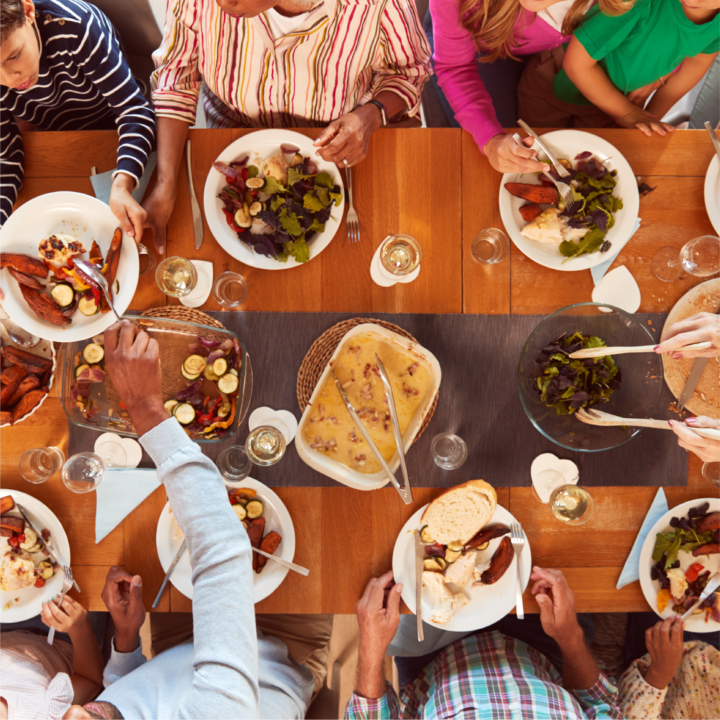In homes across the country, many Americans sit down at the dinner table each night as a family to enjoy each other’s company and a hot meal. This sacred tradition, often referred to as the ‘family dinner’, wasn’t truly formed until the late 18th century when dining rooms and dining tables became commonplace in American homes. Learn more about the history of family dinners.
Rooted in tradition, family dinners today continue to offer parents and their children a unique opportunity for meaningful conversations to occur during mealtimes. Recent research has shown that regular family dinners offer a wide range of physical, social-emotional, and academic benefits for children (The Family Dinner Project, 2021).
The social-emotional benefits of eating together as a family
Let’s take a look at some of the scientifically proven social-emotional benefits of eating together as a family:
Language and vocabulary benefits
Dinnertime storytelling creates rich language opportunities for young children to further develop their language and communication skills.
Lower risk of depression and anxiety
Consistent parental engagement around the dinner table lowers the risk that teens will experience depression, anxiety, or substance abuse issues.
Improved academic performance
Adolescents who ate family meals five to seven times a week were twice as likely to get As in school as those who ate dinner with their families fewer than two times a week.
Increased feelings of connectedness
Family dinners promote social engagement and conversations between a child or teen and their parents and siblings. In a recent survey, American teens were asked when they were most likely to talk with their parents; dinner was their top answer (Science says: eat with your kids, 2015).
Give our past blog post, Signs of Social-Emotional Distress in Children, a read for additional insight on social-emotional ‘red flags’ we can look out for in our children.
Improved social skills
Research shows that kids whose families prioritize dinnertime have fewer social-emotional conflicts at school and show more confidence and positivity about friendships and peer relationships (Five Ways Family Dinners Build Stronger Kids (and Adults), 2017).
Improved self-esteem
More opportunities for social engagement, connection, and peer relationships all lead to improved self-esteem. Read more about encouraging self-esteem in our past blog post, Self-Esteem and Self-Worth: How to Teach Both.
Two important pitfalls to avoid during family dinner
1. Watching television or having cell phones at the dinner table
Having the TV on or access to cell phones at the dinner table, basically cancels out any of the benefits outlined above. In fact, having access to screen time at the dinner table can do more harm than good. Read more about the consequences of tech at the table.
2. Using family dinners as a time to probe your child for information
Simply sitting around a dining table won’t produce magical results on its own. Remember to keep the experience positive and to avoid setting up unrealistic expectations around mealtime.
An added bonus? These benefits aren’t just limited to our children. Research also shows improved mental health in adults who participate in regularly-scheduled family dinners. Now that we’ve established all of the amazing benefits that family dinner has to offer, set a time and meet the family there!
Need some extra help thinking of topics to talk about around the dinner table? Dr. Anne K. Fishel’s blog Food for Thought is a great starting point. So…who’s cooking dinner tonight?!
My 10-year-old daughter loves the Everyday Speech programs. Her speech therapist always has new insightful activities related to social communication and stories that relate to everyday life. Thank you for promoting such positive and noteworthy social learning skills.
– Lisa, Everyday Speech Parent






